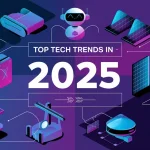AI-Powered Everything: Top Tech Trends Shaping 2025
The technological landscape is evolving rapidly, and Artificial Intelligence (AI) stands at the forefront of this transformation. In 2025, AI will influence virtually every industry, from healthcare to finance, education to entertainment. The convergence of AI with other technologies like machine learning, robotics, and the Internet of Things (IoT) is set to revolutionize how we work, live, and interact with the world around us. In this article, we will explore the most significant AI-powered tech trends shaping 2025 and beyond.
Table of Contents
- AI in Healthcare: Revolutionizing Medicine
- AI in Finance: Enhancing Security and Efficiency
- AI in Education: Personalizing Learning
- AI and Automation: Transforming Industries
- AI in Entertainment: Creating Engaging Experiences
- Ethical Considerations: The Impact of AI
AI in Healthcare: Revolutionizing Medicine
One of the most significant areas where AI will make a profound impact is healthcare. In 2025, AI-powered technologies will assist doctors and healthcare providers in diagnosing and treating diseases more accurately and efficiently. AI’s ability to analyze vast amounts of medical data, such as patient histories, lab results, and medical imaging, will help identify conditions earlier than ever before, potentially saving lives.
AI applications in healthcare include:
- Predictive Analytics: AI can predict the likelihood of a disease developing based on genetic, lifestyle, and environmental factors, allowing for preventative measures to be taken.
- Medical Imaging: AI algorithms will be able to analyze X-rays, MRIs, and other medical images faster and more accurately than human doctors, assisting in diagnosing conditions like cancer or heart disease.
- Personalized Treatment Plans: AI will create personalized treatment plans based on individual patient data, enhancing the precision of medical care.
AI in Finance: Enhancing Security and Efficiency
AI’s influence in the finance sector is expected to grow significantly by 2025. From fraud detection to algorithmic trading, AI will help financial institutions reduce risks, improve customer service, and automate manual processes. AI algorithms will analyze vast amounts of transaction data in real-time to detect unusual patterns and potential fraud, ensuring greater security for both businesses and consumers.
Some key areas where AI will revolutionize finance include:
- Fraud Detection: AI can detect fraudulent transactions by identifying patterns and anomalies that would be difficult for humans to spot.
- Algorithmic Trading: AI-powered trading systems will help investors make more informed decisions by analyzing market data and executing trades based on real-time information.
- Customer Support: AI chatbots and virtual assistants will provide 24/7 customer support, handling everything from account inquiries to loan applications.
AI in Education: Personalizing Learning
The education sector will also see a significant transformation due to AI in 2025. AI-powered tools will enable personalized learning experiences, allowing educators to tailor their teaching methods to the unique needs of each student. By analyzing student data, AI can identify learning patterns, strengths, and weaknesses, helping teachers provide more effective and individualized instruction.
AI in education will provide the following benefits:
- Personalized Learning: AI can create personalized learning paths for students, ensuring they receive the support they need to succeed.
- Automated Grading: AI can automate the grading process, freeing up teachers’ time to focus on instruction.
- Intelligent Tutoring Systems: AI-powered tutoring systems will assist students with homework and assignments, providing instant feedback and guidance.
AI and Automation: Transforming Industries
By 2025, AI-driven automation will become a central component of many industries. From manufacturing to logistics, AI-powered robots and systems will streamline operations, reduce costs, and improve productivity. AI algorithms will be used to predict demand, manage supply chains, and optimize manufacturing processes, leading to more efficient production and distribution systems.
AI’s role in automation will extend to:
- Smart Factories: AI-driven robots and machines will handle repetitive tasks with greater precision and speed, leading to more efficient production lines.
- Supply Chain Optimization: AI can forecast demand and optimize inventory management, reducing waste and improving delivery times.
- Autonomous Vehicles: Self-driving trucks and delivery drones will revolutionize logistics, making transportation faster, safer, and more cost-effective.
AI in Entertainment: Creating Engaging Experiences
The entertainment industry will continue to be transformed by AI in 2025. AI-powered algorithms will be used to create personalized recommendations for users, analyze viewer preferences, and even generate new content. From gaming to streaming services, AI will enhance user experiences and provide more engaging and immersive content.
AI’s impact on entertainment includes:
- Personalized Content Recommendations: AI will analyze user behavior and preferences to recommend movies, shows, and music tailored to individual tastes.
- AI-Generated Content: AI algorithms will be used to create new music, art, and even video games, offering unique and innovative experiences.
- Enhanced Gaming: AI will create smarter, more responsive non-player characters (NPCs) in video games, making gameplay more immersive.
Ethical Considerations: The Impact of AI
As AI continues to evolve, ethical considerations will become increasingly important. Issues such as data privacy, job displacement, and algorithmic bias must be addressed to ensure that AI benefits society as a whole. It is essential to develop AI technologies that are transparent, fair, and accountable to prevent misuse and ensure that they serve the common good.
Key ethical concerns surrounding AI include:
- Data Privacy: With AI processing large amounts of personal data, ensuring privacy and security will be a top priority.
- Job Displacement: As automation increases, there will be concerns about job losses, especially in sectors that rely on manual labor.
- Algorithmic Bias: AI algorithms must be carefully designed to avoid bias, ensuring fairness and equity in decision-making processes.
Conclusion
In 2025, AI will continue to reshape industries and society as a whole. From healthcare to finance, education to entertainment, the integration of AI will lead to smarter, more efficient systems that improve the quality of life for people around the world. However, it is crucial to address the ethical challenges that accompany these advancements to ensure that AI is used responsibly and equitably. As AI technologies evolve, we must remain mindful of their impact and work toward a future where AI enhances human potential and creativity.



